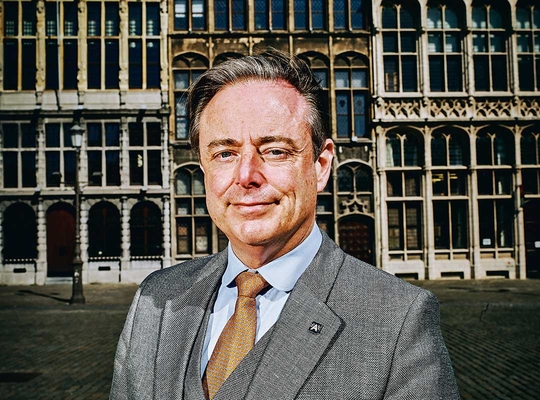You are here
Bart De Wever: “There must be a transformation, and that can only come from our own strength”

In the Radio 1 podcast “Ontbijten met Michaël Van Droogenbroeck”, N-VA national chairman Bart De Wever once again points out the urgent need for a thorough reform of the country. “In 2024, the inability to make Belgium balance the figures will force us to change. A confederal transformation is the only thing that can be deduced from this. But then people will have to vote wisely.”
“The Flemish finally have a right to a government that systematically backs the concerns of productive people, who create the wealth. That is not happening today. We may be in a period of crisis, but in the meantime, we are wasting so many opportunities because nothing is happening. We have the highest taxes on labour in the world, the highest budget deficit, the lowest economic growth and the highest government spending. All alarm signals are dark red. There must be a transformation, and I firmly believe that it can only come from Flanders,” says Bart De Wever.
Flanders is doing better
“Flanders is definitely doing better,” says Bart De Wever firmly. “Look at the debt ratio or the budgetary path. Major decisions are being made, such as the nitrogen agreement and the construction shift. It is precisely because these decisions are fundamental that there is so much controversy about them. But in the meantime, you can see that Flanders is once again moving towards a balanced budget, while other parts of the country are heading for bankruptcy.”
Belgium is just not working anymore
“In 2024, the inability of Belgium to balance the budget will force us to change anyway. Wallonia is becoming more left-wing than ever, with a PS party that feels hounded by the communists and an equally left-wing Ecolo party, while we are the largest party in Flanders and the far right also has a large following. Belgium is just not working anymore. A confederal transformation is the only thing that can be deduced from this. I am absolutely convinced of that.”
Cramped PS
It is clear that this will mainly involve talking to the PS. However, the recent statements by PS chairman Magnette - “that he is not a requesting party for state reform” - are no surprise to Bart De Wever. “Magnette feels he is being harassed by a Belgian nationalist PVDA-PTB party and a Bouchez who is constantly firing bullets. The Walloon red trade unions don’t even think the Vivaldi government is left-wing enough. He is completely cramped, also because of the results of the recent French parliamentary elections. But, in fact, he thinks the same as I do: it’s not working anymore.”
New reality
“Of course, the PS party currently has the luxury of maintaining the status quo. They must not force the change. Belgium earns them a lot of money. The Vivaldi government Transfers The money flows from Flanders to Brussels and Wallonia are called transfers. The transfers from the federal budget, the Financing Law and social security amount to between 6 and 7 billion euros per year, and 11 billion euros if debt repayments are included. The size of the transfers is always contested by the French-speaking side or they are just referred to as normal solidarity contributions. A study by Vives (KU Leuven) revealed that the transfers did not serve solidarity, but had a paralysing effect on the growth of both the Walloon and Flemish economies. transfers a lot of wealth from the active, working people – simply put, the Flemish – to the passive, unemployed people. The longer that lasts, the better they like it. But they also know that this change is coming. So I don’t expect any help now, but we will wake up to a new reality the day after the elections.”
Our own strength
“If the people in Flanders vote wisely, we can bring about this transformation. I am relying exclusively on my own strength and that of my party, and on the Flemish voter. Not on so-called allies on the other side of the Language border The language border between a Flemish and a French-speaking area was permanently established in the period from 1962 to 1963. The Brussels-Capital district, with 19 municipalities, became officially bilingual. The language border was not a Flemish invention. Since the beginning of the 20th century, French-speakers, and certainly the socialists, have strongly advocated for monolingual areas in Belgium. Today, Flemings want respect for the language border and the bilingual nature of Brussels. language border ,” Bart De Wever concludes.

